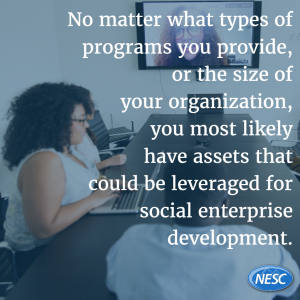 With diminishing charitable donations and public funding becoming a major issue for many nonprofit organizations, today’s nonprofit leaders are looking to social enterprise as a way to generate potentially significant sources of unrestricted cash that will reduce their nonprofit’s reliance on traditional funding to support its mission and achieve its goals.
With diminishing charitable donations and public funding becoming a major issue for many nonprofit organizations, today’s nonprofit leaders are looking to social enterprise as a way to generate potentially significant sources of unrestricted cash that will reduce their nonprofit’s reliance on traditional funding to support its mission and achieve its goals.
What is Social Enterprise?
Social enterprise is any activity that:
- Helps to deliver on an organization’s social mission and
- Delivers a sustainable financial return
For most nonprofits, this is done by leveraging and monetizing existing assets. Types of assets that might be leveraged include:
- Human: Do you have employees or volunteers whose time or expertise can be shared?
- Physical: Do you have underused space or facilities that could be made available to or shared with others?
- Technological: Do you have systems or processes that could be either licensed or made available as a service?
- Brand: Does your organization have a reputation or visibility that would be valued by potential business partners or customers?
Developing a Social Enterprise
Identifying a promising social enterprise opportunity and implementing it to its full potential requires the same disciplined analysis and management expertise found in any successful business. When NESC works with a nonprofit to create a social enterprise business, it builds on the nonprofit’s capabilities and works closely with their team, following a 3-step process:
- Identify
The first step is to do a systematic review of your assets, identifying those that are underleveraged, and then evaluate each potential social enterprise opportunity for suitability and revenue potential. Suitability is especially important, because activities that are not a good fit with an organization’s culture or expertise are not likely to succeed in the long run, even if the financial numbers look good on paper. - Plan
The second step is to create a detailed, focused business plan for the social enterprise, including goals, strategies, and financial projections. Think of the social enterprise as a business start-up. You will need a clear roadmap that shows how the enterprise will achieve both its social and financial objectives, which will help you identify the activities and resources required along the way. And the business plan will also be useful if you need to approach potential funders for money (i.e., investment capital) to get it to the point of self-sustainability. - Implement
When you have an approved plan and any necessary startup funding, the final step is implementation: assign or hire staff, execute marketing or sales tactics to attract partners or customers, and implement metrics for tracking results and improving performance as necessary. Depending on the opportunity, you could do a pilot program to test the concept before doing a full rollout.
Social Enterprise Success Factors
In our experience helping nonprofits start up social enterprise businesses, we’ve found that there are four key factors that determine whether the social enterprise is sustainable and successful in the long run:
- Scalability
Does the enterprise have the potential for profitability as it grows over time? Is the long-term potential revenue sufficient to cover the fixed expenses and deliver positive cash flow to the parent organization? - Adequate Funding and Resources
Does the enterprise have sufficient startup funding to put the necessary staff and operations in place and to keep running until revenue grows to the point where revenue exceeds expenses? - Broad Mindset
Is the parent organization’s leadership (including the board) prepared to support an enterprise that may not pay back in the first year or two? Will the leadership and others in the organization support an enterprise that doesn’t operate according to the unwritten rules that they may be used to in the nonprofit world? Is the organization prepared for growth? - Metrics
Does the enterprise have the discipline to identify key business and social metrics, track the results, and change their plans as needed to improve performance?
Conclusion
Social enterprise can be an important source of unrestricted funds that will help a nonprofit grow and increase its social impact. But as more organizations develop social enterprises, the success factors are becoming clearer. By taking a long-term approach and applying business discipline to the management of the enterprise, it may be possible to significantly increase the funds you have to deliver on your mission.
To watch one of our social enterprise case studies, see the video here.
Agree? Disagree? Share your thoughts in the Comments below.

